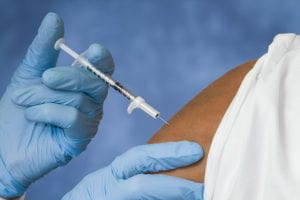Nearly 30 million Americans have received a dose of the COVID-19 vaccine – thanks to a national effort to return the country to “business as usual” after a year of restrictions designed to stop the deadly virus’s spread.
One important component of this effort is maximizing the vaccine’s level of protection for each recipient. With this in mind, researchers from Ohio State University have summarized the evidence to date on how social and psychological factors impact our biological responses, specifically to vaccines. Their article was published last month in the journal Perspectives on Psychological Science.
There are many variables that contribute to a person’s mental well-being and immune response, such as age, socioeconomic status, nutrition, and personality, to name a few. This makes it hard to draw strong conclusions. It’s also important to note that much of the research in this field was conducted more than a decade ago, and on a variety of vaccines, not those currently being administered for COVID-19.
Despite all of the caveats, the authors make a credible case that individuals’ mental health and overall wellbeing affect how well vaccines work in their bodies.
The Findings on Mental Health and Vaccination
The review begins with a summary of how vaccines work. Most vaccines use a two-pronged approach: first, within hours, the body launches an inflammatory response that leads to the initial symptoms people experience after being vaccinated. Second, the adaptive immune system kicks in to give the body a memory of viral or bacterial components in the vaccine. This allows the body to quickly respond when exposed to the actual virus or bacteria; this stage can take much longer, up to weeks or months.
The authors list a series of previous research studies, most from the 1990s and 2000s, that demonstrate that stress – in the short and long term – hampers the body’s immune response. They found that among healthy young adults, self-rated stress levels in the 10 days after vaccination, and specifically stress-related sleep loss, reduced their bodies’ immune responses to vaccines.
In another series of studies, older caregivers of spouses with dementia were significantly less likely to have a strong antibody response to the flu vaccine compared with non-caregivers of similar age and health status.
The review authors also cite research demonstrating that loneliness and lack of social support hamper vaccine response. One study found that undergraduate students who rated themselves as lonelier had lower antibody levels up to four months after receiving the flu vaccine, compared to those who were less lonely. And students who reported a smaller social network had the weakest immune responses. In another study of older adults, bereavement in the year before vaccination predicted a poorer antibody response to the flu vaccine, while same-age participants who reported high levels of marital satisfaction had a stronger antibody response.
Lastly, the authors report on health behaviors that affect immune response, including cigarette smoking, diet, sleep, and physical activity.
The review authors explain how the interplay between mental health and immune response may be especially problematic for COVID-19. This is because social distancing has isolated many people, especially older adults, at unprecedented rates, which has led to increased loneliness, depression, and anxiety.
How Behavioral Interventions Could Help
The authors suggest a wide range of interventions that may help boost immune response after receiving a vaccine. Again, measuring how well these interventions work is difficult because there are so many factors at play, and it is hard to separate them all out. But there are examples of behavioral interventions which have improved the vaccine response of study participants. For example, one study of an eight-week stress management intervention among older adults caring for a spouse with dementia found that people who participated in the intervention had a more robust response to the flu vaccine.
Another systematic review on exercise interventions found convincing evidence that short- and long-term exercise programs can improve immune responses to vaccination, especially among those who are typically sedentary.
There is also strong evidence that nutritional supplements may result in a better antibody response to vaccines, especially in older adults, who often struggle to meet recommended daily nutritional guidelines, particularly if they live alone.
The take-home message: There is clear evidence that your mental health and overall well-being affect how your body responds to vaccines. This may be especially important as people receive their COVID-19 vaccinations as recent virus safety restrictions affect our stress levels and mental health. But there are steps that you can take to help boost your immune response, including getting enough sleep, eating well, and exercising. For specific ways to boost your immune response both before and after your vaccine, it’s best to consult with your doctor.
Visit Cornell University’s Bronfenbrenner Center for Translational Research’s website for more information on our work solving human problems.




Speak Your Mind